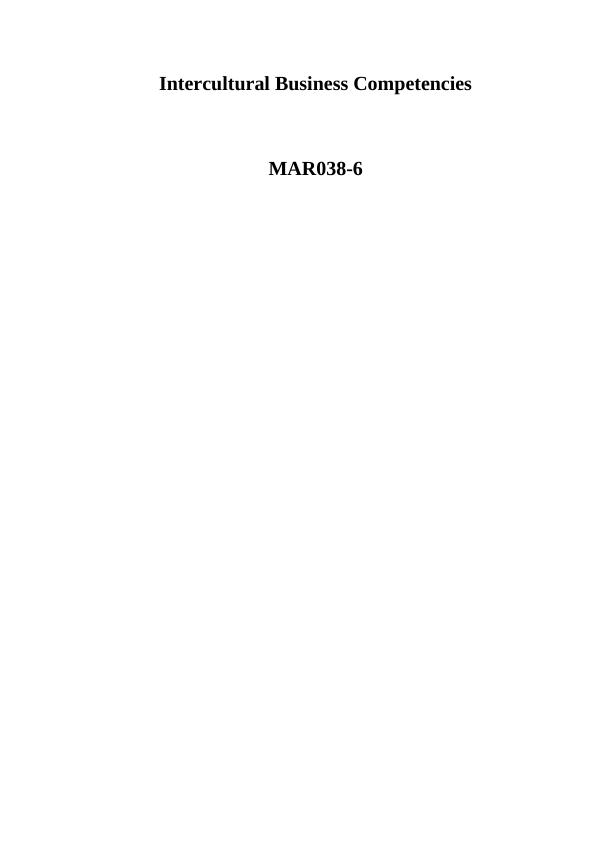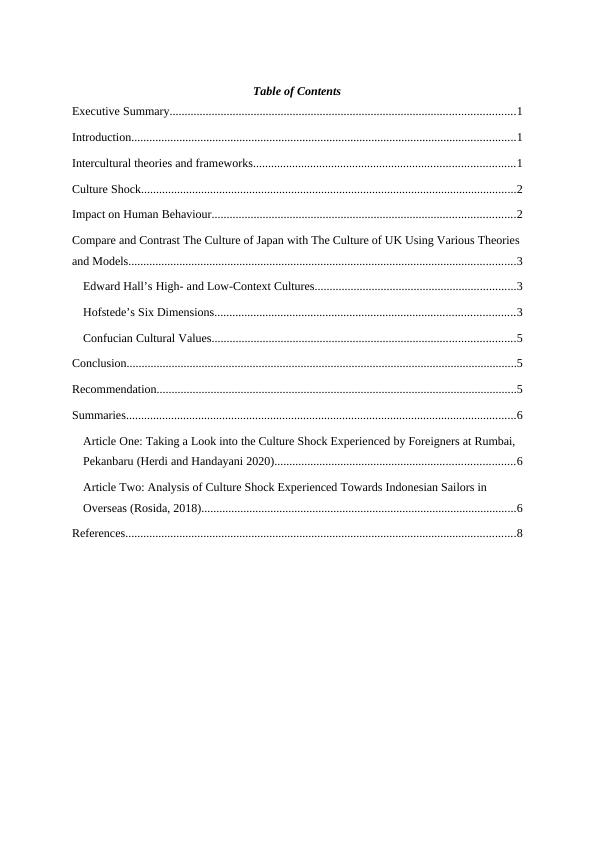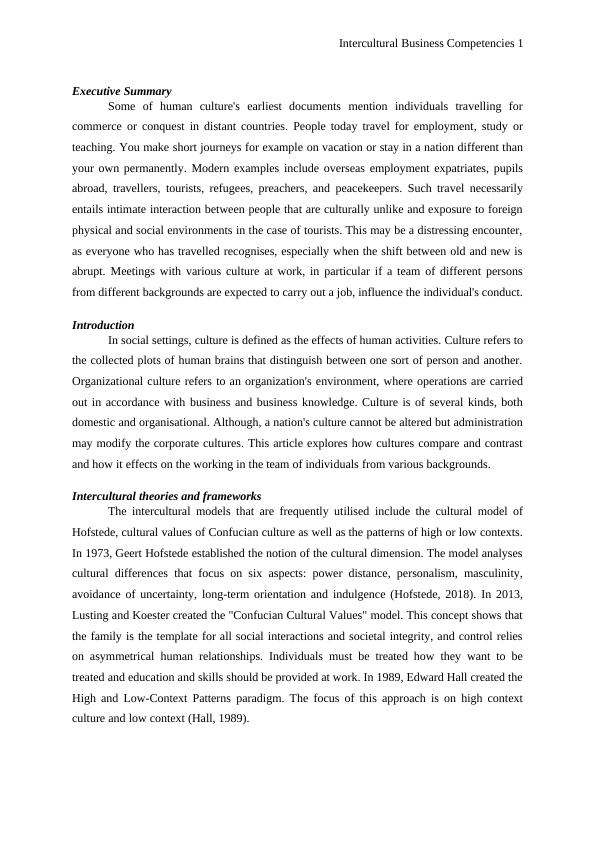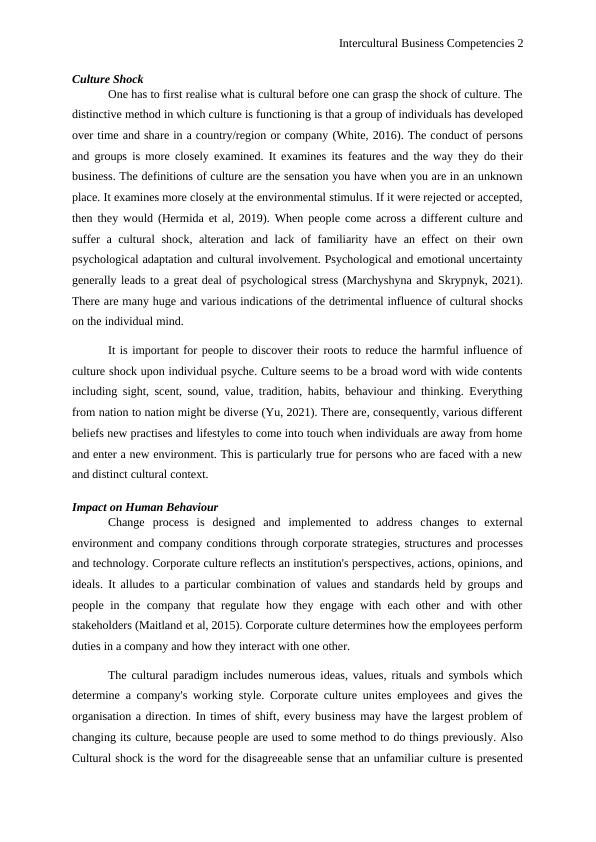MAR038-6 Intercultural Business Competencies Assignment
Added on 2021-08-30
11 Pages3217 Words122 Views
Intercultural Business Competencies
MAR038-6
MAR038-6

Table of Contents
Executive Summary...................................................................................................................1
Introduction................................................................................................................................1
Intercultural theories and frameworks.......................................................................................1
Culture Shock.............................................................................................................................2
Impact on Human Behaviour.....................................................................................................2
Compare and Contrast The Culture of Japan with The Culture of UK Using Various Theories
and Models.................................................................................................................................3
Edward Hall’s High- and Low-Context Cultures...................................................................3
Hofstede’s Six Dimensions....................................................................................................3
Confucian Cultural Values.....................................................................................................5
Conclusion..................................................................................................................................5
Recommendation........................................................................................................................5
Summaries..................................................................................................................................6
Article One: Taking a Look into the Culture Shock Experienced by Foreigners at Rumbai,
Pekanbaru (Herdi and Handayani 2020)................................................................................6
Article Two: Analysis of Culture Shock Experienced Towards Indonesian Sailors in
Overseas (Rosida, 2018).........................................................................................................6
References..................................................................................................................................8
Executive Summary...................................................................................................................1
Introduction................................................................................................................................1
Intercultural theories and frameworks.......................................................................................1
Culture Shock.............................................................................................................................2
Impact on Human Behaviour.....................................................................................................2
Compare and Contrast The Culture of Japan with The Culture of UK Using Various Theories
and Models.................................................................................................................................3
Edward Hall’s High- and Low-Context Cultures...................................................................3
Hofstede’s Six Dimensions....................................................................................................3
Confucian Cultural Values.....................................................................................................5
Conclusion..................................................................................................................................5
Recommendation........................................................................................................................5
Summaries..................................................................................................................................6
Article One: Taking a Look into the Culture Shock Experienced by Foreigners at Rumbai,
Pekanbaru (Herdi and Handayani 2020)................................................................................6
Article Two: Analysis of Culture Shock Experienced Towards Indonesian Sailors in
Overseas (Rosida, 2018).........................................................................................................6
References..................................................................................................................................8

Intercultural Business Competencies 1
Executive Summary
Some of human culture's earliest documents mention individuals travelling for
commerce or conquest in distant countries. People today travel for employment, study or
teaching. You make short journeys for example on vacation or stay in a nation different than
your own permanently. Modern examples include overseas employment expatriates, pupils
abroad, travellers, tourists, refugees, preachers, and peacekeepers. Such travel necessarily
entails intimate interaction between people that are culturally unlike and exposure to foreign
physical and social environments in the case of tourists. This may be a distressing encounter,
as everyone who has travelled recognises, especially when the shift between old and new is
abrupt. Meetings with various culture at work, in particular if a team of different persons
from different backgrounds are expected to carry out a job, influence the individual's conduct.
Introduction
In social settings, culture is defined as the effects of human activities. Culture refers to
the collected plots of human brains that distinguish between one sort of person and another.
Organizational culture refers to an organization's environment, where operations are carried
out in accordance with business and business knowledge. Culture is of several kinds, both
domestic and organisational. Although, a nation's culture cannot be altered but administration
may modify the corporate cultures. This article explores how cultures compare and contrast
and how it effects on the working in the team of individuals from various backgrounds.
Intercultural theories and frameworks
The intercultural models that are frequently utilised include the cultural model of
Hofstede, cultural values of Confucian culture as well as the patterns of high or low contexts.
In 1973, Geert Hofstede established the notion of the cultural dimension. The model analyses
cultural differences that focus on six aspects: power distance, personalism, masculinity,
avoidance of uncertainty, long-term orientation and indulgence (Hofstede, 2018). In 2013,
Lusting and Koester created the "Confucian Cultural Values" model. This concept shows that
the family is the template for all social interactions and societal integrity, and control relies
on asymmetrical human relationships. Individuals must be treated how they want to be
treated and education and skills should be provided at work. In 1989, Edward Hall created the
High and Low-Context Patterns paradigm. The focus of this approach is on high context
culture and low context (Hall, 1989).
Executive Summary
Some of human culture's earliest documents mention individuals travelling for
commerce or conquest in distant countries. People today travel for employment, study or
teaching. You make short journeys for example on vacation or stay in a nation different than
your own permanently. Modern examples include overseas employment expatriates, pupils
abroad, travellers, tourists, refugees, preachers, and peacekeepers. Such travel necessarily
entails intimate interaction between people that are culturally unlike and exposure to foreign
physical and social environments in the case of tourists. This may be a distressing encounter,
as everyone who has travelled recognises, especially when the shift between old and new is
abrupt. Meetings with various culture at work, in particular if a team of different persons
from different backgrounds are expected to carry out a job, influence the individual's conduct.
Introduction
In social settings, culture is defined as the effects of human activities. Culture refers to
the collected plots of human brains that distinguish between one sort of person and another.
Organizational culture refers to an organization's environment, where operations are carried
out in accordance with business and business knowledge. Culture is of several kinds, both
domestic and organisational. Although, a nation's culture cannot be altered but administration
may modify the corporate cultures. This article explores how cultures compare and contrast
and how it effects on the working in the team of individuals from various backgrounds.
Intercultural theories and frameworks
The intercultural models that are frequently utilised include the cultural model of
Hofstede, cultural values of Confucian culture as well as the patterns of high or low contexts.
In 1973, Geert Hofstede established the notion of the cultural dimension. The model analyses
cultural differences that focus on six aspects: power distance, personalism, masculinity,
avoidance of uncertainty, long-term orientation and indulgence (Hofstede, 2018). In 2013,
Lusting and Koester created the "Confucian Cultural Values" model. This concept shows that
the family is the template for all social interactions and societal integrity, and control relies
on asymmetrical human relationships. Individuals must be treated how they want to be
treated and education and skills should be provided at work. In 1989, Edward Hall created the
High and Low-Context Patterns paradigm. The focus of this approach is on high context
culture and low context (Hall, 1989).

Intercultural Business Competencies 2
Culture Shock
One has to first realise what is cultural before one can grasp the shock of culture. The
distinctive method in which culture is functioning is that a group of individuals has developed
over time and share in a country/region or company (White, 2016). The conduct of persons
and groups is more closely examined. It examines its features and the way they do their
business. The definitions of culture are the sensation you have when you are in an unknown
place. It examines more closely at the environmental stimulus. If it were rejected or accepted,
then they would (Hermida et al, 2019). When people come across a different culture and
suffer a cultural shock, alteration and lack of familiarity have an effect on their own
psychological adaptation and cultural involvement. Psychological and emotional uncertainty
generally leads to a great deal of psychological stress (Marchyshyna and Skrypnyk, 2021).
There are many huge and various indications of the detrimental influence of cultural shocks
on the individual mind.
It is important for people to discover their roots to reduce the harmful influence of
culture shock upon individual psyche. Culture seems to be a broad word with wide contents
including sight, scent, sound, value, tradition, habits, behaviour and thinking. Everything
from nation to nation might be diverse (Yu, 2021). There are, consequently, various different
beliefs new practises and lifestyles to come into touch when individuals are away from home
and enter a new environment. This is particularly true for persons who are faced with a new
and distinct cultural context.
Impact on Human Behaviour
Change process is designed and implemented to address changes to external
environment and company conditions through corporate strategies, structures and processes
and technology. Corporate culture reflects an institution's perspectives, actions, opinions, and
ideals. It alludes to a particular combination of values and standards held by groups and
people in the company that regulate how they engage with each other and with other
stakeholders (Maitland et al, 2015). Corporate culture determines how the employees perform
duties in a company and how they interact with one other.
The cultural paradigm includes numerous ideas, values, rituals and symbols which
determine a company's working style. Corporate culture unites employees and gives the
organisation a direction. In times of shift, every business may have the largest problem of
changing its culture, because people are used to some method to do things previously. Also
Cultural shock is the word for the disagreeable sense that an unfamiliar culture is presented
Culture Shock
One has to first realise what is cultural before one can grasp the shock of culture. The
distinctive method in which culture is functioning is that a group of individuals has developed
over time and share in a country/region or company (White, 2016). The conduct of persons
and groups is more closely examined. It examines its features and the way they do their
business. The definitions of culture are the sensation you have when you are in an unknown
place. It examines more closely at the environmental stimulus. If it were rejected or accepted,
then they would (Hermida et al, 2019). When people come across a different culture and
suffer a cultural shock, alteration and lack of familiarity have an effect on their own
psychological adaptation and cultural involvement. Psychological and emotional uncertainty
generally leads to a great deal of psychological stress (Marchyshyna and Skrypnyk, 2021).
There are many huge and various indications of the detrimental influence of cultural shocks
on the individual mind.
It is important for people to discover their roots to reduce the harmful influence of
culture shock upon individual psyche. Culture seems to be a broad word with wide contents
including sight, scent, sound, value, tradition, habits, behaviour and thinking. Everything
from nation to nation might be diverse (Yu, 2021). There are, consequently, various different
beliefs new practises and lifestyles to come into touch when individuals are away from home
and enter a new environment. This is particularly true for persons who are faced with a new
and distinct cultural context.
Impact on Human Behaviour
Change process is designed and implemented to address changes to external
environment and company conditions through corporate strategies, structures and processes
and technology. Corporate culture reflects an institution's perspectives, actions, opinions, and
ideals. It alludes to a particular combination of values and standards held by groups and
people in the company that regulate how they engage with each other and with other
stakeholders (Maitland et al, 2015). Corporate culture determines how the employees perform
duties in a company and how they interact with one other.
The cultural paradigm includes numerous ideas, values, rituals and symbols which
determine a company's working style. Corporate culture unites employees and gives the
organisation a direction. In times of shift, every business may have the largest problem of
changing its culture, because people are used to some method to do things previously. Also
Cultural shock is the word for the disagreeable sense that an unfamiliar culture is presented

End of preview
Want to access all the pages? Upload your documents or become a member.
Related Documents
BUS101 Communication Assignment: Intercultural Communication Assignmentlg...
|9
|1737
|40
Cross Cultural Analysis Techniques: Key Perspectives and Relevancelg...
|8
|2174
|88
International Management: Hofstede Model of Culture and Managing a Diverse Workforcelg...
|18
|1803
|455
